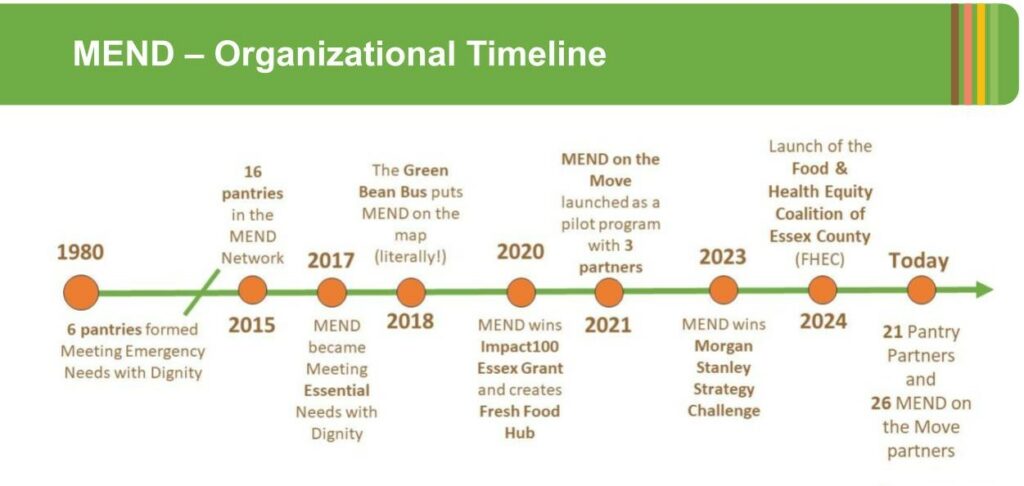Formation
In 1980, a small group of Essex County houses of worship saw the need for a coordinated local effort of food distribution to alleviate hunger. They envisioned a network of donors, food pantries, and agencies all working together. Thus, Meeting Emergency Needs with Dignity (MEND) was formed.
Funds were donated, a bank account established, and The Archdiocese of Newark contributed office space. Andy Ball from the First Presbyterian Church, Caldwell, took a one-year social service leave from Xerox to work with Kathleen DiChiara in building the MEND network of pantries and donor organizations. It was at this time the Archdiocesan Emergency Food Program (AEFP) was started, with Kathleen serving in the dual role of Director of the AEFP and the MEND Coordinator.
When Kathleen left to form the Community FoodBank of New Jersey, Catholic Charities, the Archdiocese’s social service arm, assumed responsibility for AEFP and MEND. Sharon Reilly-Tobin succeeded Kathleen as the Director of Catholic Charities’ Emergency Food Network and as the MEND Coordinator, and served in this capacity for over 33 years.
Organization
In 2010, MEND became a 501(c)(3) tax-exempt organization, and the MEND Board of Trustees was formed. MEND developed a strategic plan for its food pantry network that emphasized community outreach, food support, and infrastructure to help clients move beyond the food pantry toward self-sufficiency.
Growth
In 2015, as the number of patrons its network served continued to increase significantly, MEND hired Robin Peacock as its grants and special projects consultant to help grow its visibility and expand and diversify its funding. MEND launched its “Healthy Pantries, Healthy Patrons” as a pilot program in 2016, the goal of which was to increase its food pantry patrons’ access to fresh and healthy food, expanding it to a year-round program in 2017.
Sharon left Catholic Charities at the end of 2017, and MEND appointed Robin Peacock as its first Executive Director. Also in 2017, in recognition of the ongoing economic challenges our patrons face, MEND changed its name to Meeting Essential Needs with Dignity.
At the end of of 2017, MEND had provided supplemental food for 117,600 patrons.
2018-Present
Beginning in 2018, MEND shifted its focus to removing barriers to accessing fresh and healthy food, starting with the acquisition of a former school bus. Outfitted with a new color scheme and interior shelving, the bus was named the “Green Bean”, and acted as MEND’s first mobile food pantry and food collection vehicle. The Green Bean allowed MEND to distribute produce donated by area farms and purchased from The Community Food Bank of NJ, eliminating some of the challenges pantries faced in obtaining and transporting fresh food.
Transforming Traditional Hunger Relief
In 2020, MEND was awarded the Impact100 Essex grant, enabling MEND to establish a centralized warehouse in Orange, NJ, known as The Fresh Food Hub, and to purchase a delivery van, called The Sweet Pea. Both the establishment of the Hub and the use of the Sweet Pea further helped to alleviate the logistical burdens that limited the food pantries’ ability to independently source, store, and distribute fresh and healthy food.
In 2022 MEND on the Move was launched as a year-round program, following a successful pilot. MOTM uses free farmers markets, called “mobile markets”, and home deliveries to bring food directly and consistently to those who need it most. Designed collaboratively with over 25 community partners, the MOTM program served over 78,000 people in 2023.
Today, MEND supports a network of 46 community service organizations, which include traditional food pantries as well as schools and social service agencies, providing fresh and healthy food, resources, and funds intended to expand each partner’s capacity to increase nutritious food options for their patrons. All programs are designed to reduce barriers to accessing nutritious food in food desert communities, and advance health equity by bringing nutritious food directly and consistently to those who need it most.
In 2023, provided support to 490,000 people. 90% of the food MEND provided was fresh, and over 70% was sourced from local growers and farms.

